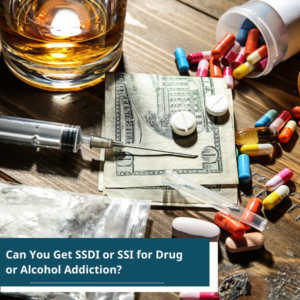
Social Security Disability Insurance (SSDI) and Supplemental Security Income (SSI) provide financial support to individuals with disabilities. As drug and alcohol addiction can be among the most debilitating disorders an individual can face, many people wonder if these programs cover substance use disorders.
Can You Get Disability Benefits for Drug Addiction or Alcoholism?
The short answer is no. You cannot receive SSDI or SSI benefits solely based on drug addiction or alcoholism. In 1996, the Social Security Administration (SSA) changed its policy to exclude substance use disorders as a qualifying disability on their own.
Does Drug or Alcohol Addiction Impact Eligibility?
While you cannot receive benefits for addiction alone, having a history of drug or alcohol use does not automatically disqualify you from receiving disability benefits. The critical factor is whether your addiction is a “contributing factor material to the determination of disability.”
Here is what this means:
- If you have a disabling condition unrelated to your substance use, you may still qualify for benefits.
- If your condition would improve to the point where you could work if you stopped using drugs or alcohol, the SSA will likely deny your claim.
- If you would still be disabled even if you stopped using substances, you may be eligible for benefits.
For example, if you have liver damage from alcohol use that would persist even if you achieved sobriety, this condition could potentially qualify you for benefits. However, if your liver function would return to normal after stopping alcohol use, allowing you to work, you likely would not qualify.
How to Process Your Application for SSDI and SSI
When applying for disability benefits with a history of substance use, consider these steps:
- Be honest about your substance use history. Trying to hide this information can hurt your case.
- Provide medical evidence of your disabling conditions, including medical records unrelated to substance use.
- If possible, establish a period of sobriety. Doing so can help demonstrate whether your disabling conditions persist without substance use.
- Get a statement from your treating physician about how your conditions would affect your ability to work if you stopped using substances.
- Consider seeking treatment for your substance use disorder. This shows the SSA that you are taking steps to address your addiction.
The SSA will evaluate your case individually. They will look at all your medical conditions and how they impact your ability to work, with or without ongoing substance use.
Contact Our Oklahoma Disability Attorneys Today
Navigating a substance use disorder disability claim can be challenging. At Ryan Bisher Ryan & Simons, we have decades of experience helping Oklahoma residents with their disability claims. We understand the nuances of SSDI for drug addiction and SSI for alcohol addiction cases.
Our social security disability attorneys work directly with clients, providing personalized attention to each case. If you are struggling with addiction and a disability, our experienced team can help you understand your options and guide you through the application process.
We offer free consultations to discuss your case and explain how addiction and SSDI eligibility interact. Contact us today and let our experienced Oklahoma disability attorneys help you pursue the benefits you need.


